The Greek island of Paros Greece is one of the most popular and touristy Greek islands.
Paros is located in the heart of the Cyclades, in the Aegean sea, in front of Naxos and near Mykonos. It is a popular island and the reasons are obvious: exquisite sandy beaches in crystal waters, Parian traditional villages with whitewashed cubic houses in narrow paved alleys contrasted with the many colorful bougainvilleas, lovely chapels, an exciting nightlife…
Paros Island was known in antiquity for its fine marble. The main town is Parikia. The most cosmopolitan area of the island is Naoussa.
Book now a car in Paros island
Villages
Parikia Paros:
Also called Paros Town or Hora, Parikia is the capital of Paros Greece and has about 3000 inhabitants. Parikia was built on the same site where the ancient city and capital used to stand. This little town is the commercial and cultural center of Paros as well as the main harbor of the island, serving many other islands; for the many connections Paros offer, thousands of visitors are passing every summer by Parikia just to catch a connection for another island. Parikia is built amphitheatrically around the port and has a typical Cycladic architecture, with whitewashed cubic and flat-roofed houses with spare architectural lines and colored wooden doors, windows and balconies.
On the entrance of the port, a superb whitewashed windmill welcomes the visitors and constitutes the trademark of Paros. The bus station and taxi station are located nearby. Numerous restaurants, taverns, cafes, bars and night clubs are lining the one side of the coast road (which is closed for the cars during the evening) while the town’s beach is boarding the second part of the road. A few minutes of walking from the port leads to the heart of the traditional Cycladic settlement of Parikia, which is clustered around the hill of Kastro (Castle). This quarter is typically Cycladic, full of whitewashed two-story houses with colored windows, doors and balconies and old mansions, separated by narrow whitewashed streets forming a labyrinth. The castle, called Kastro, was built during the 13th century on the highest point of the town; for its construction, materials and columns from an Ancient Acropolis Temple, which used to stand in the same place, were used. Nowadays, only a part of the wall and a tower are remaining from the Venetian castle.
Many churches are surrounding Kastro such as the Panagia Septemvriani (The Virgin of September), the Church of Agia Eleni (Saint Helen) and the most important and old of all, the beautiful Byzantine church of Panagia Ekatontapiliani (Our Lady of the Hundred Gates), which is considered as one of the most important Byzantine monument still standing in Greece; this church also houses a fine museum. Another interesting museum is the Archaeological Museum of Paros, located behind the church of Panagia Ekatontapiliani and exhibits a collection of various findings (such as sculptures, inscriptions, vases, etc…) dating from the Neolithic and Roman periods. Other very interesting sites to visit nearby Parikia are the ruins of Asclepieio, the Temple of Aphrodite, the Temple of Eileithyia (Truth), the Temple of Zeus Ypatos and more.
Naoussa Paros:
The beautiful picturesque fishing village of Naoussa is located in a huge bay in the northern part of Paros, 10 kilometers east from the capital, Parikia.
Naoussa is considered to be one of the prettiest villages in the Cyclades and, despite the development of tourism, this lovely village has managed to keep its authenticity, its character and its charm, with its whitewashed and flowered little houses and its tiny whitewashed churches and chapels, surrounded by labyrinth-like narrow, stone-paved streets. The lovely village of Naoussa is built amphitheatrically around a tiny picturesque port where little colorful fishing boats called caiques are mooring and where remains of a Venetian castle can still be seen, creating a particular and enchanting atmosphere.
Little taverns and ouzeries (places where we drink ouzo and eat appetizers, called “mezedes”) are boarding the port, creating a friendly and traditional atmosphere.
Even if Naoussa is much quitter than Parikia, it also offers animated bars and night-clubs, opened until dawn. Naoussa, Paros is also famous for its numerous beautiful golden beaches, filling the huge bay of Naoussa, such as Kolymbithres Beach, Agios Ioannis, Agioi Anargyroi, Monastiri and much more. From the wildest and more secluded beach to the fully organized one, those beaches are ideal for everyone, filling every need. All can be reached by footpaths, asphalted road or by caiques (small fishing boats).
Naoussa also has many beautiful churches to visit such as its main church, Kimissis tis Theotokou (the Church of the Assumption of the Virgin) which is located on the highest spot of the village or the Church of Agios Nikolaos (Saint Nicholas) in which is housed an interesting Byzantine Museum exposing fine and valuable 13th century icons. Every 23rd of August, nine days after the Assumption of the Virgin, a great festivity is celebrated in Naoussa, during which a representation of the pirates’ raids is performed by the young people of the village, fireworks are thrown and dancing, eating and drinking is continuing until dawn. Many archaeological sites and monuments can be found in the area surrounding the lovely village of Naoussa and are very interesting to visit
Lefkes Paros:
One of the loveliest villages of Paros, Lefkes is situated in the central part of Paros, 11 kilometers south-east of Parikia.
Lefkes has 500 inhabitants and is built at an altitude of 300 meters above the sea level, on a verdant hill covered with olive trees and pine trees and offers a breathtaking view of Naxos Island. This beautiful village used to be Paros’ capital during Middle-Age and is full of little traditional whitewashed houses, mixed with Venetian architecture, wonderful churches dating from the 15th century, whitewashed windmills and beautiful dovecotes. The charm and the beauty of Lefkes are still untouched by mass tourism, which helps it maintain its authenticity.
The Church of Agia Triada (Holy Trinity) is the village’s main church; it is a beautiful Byzantine church made of fine white marble, glimmering under the sun; rare and valuable Byzantine icons are housed in this church and are very worth-seeing.
In Lefkes are also a Folk Art Museum that exhibits various local tools and clothing and a Museum of Aegean Folk. From this marvelous village, the “Byzantine Road”, a paved footpath dating from the Byzantine period, leads to the village of Prodromos and finishes down to the sea.
Museum – Church
The Frankish Castle of Paros:
The splendid Frankish Castle is one of the most enduring monuments on the island of Paros. It was built in the 1200s by the then Venetian Sanoudos. Scholars believe that the castle was built from the vestiges of an assortment of ancient sanctuaries that were scattered in and around the island of Paros. The Frankish Castle stands out for its splendid architecture. Needless to say, a visit to Paros is incomplete without a visit to this magnificent castle which stands as mute testimony to Paros’ rich virile past. The castle is conspicuous by its intricate stonework and the hundred-footer Hekatompedon that is fabricated into its walls. The elongated tower integrates all the elements of a 4th-century globular edifice, built during the Frankish era. Part of the circular edifice is used as the apse of the castle’s in-house chapel. The basis of an ancient temple which is believed to date back all the way to 530 BC. Along with the temple ruins, there are also scattered remnants of ancient residences. Located at the highest point of Parikia, the Frankish Castle guarantees a breathtaking view of the surrounding area.
Paros, Ekatontapiliani Byzantine Museum:
The Ekatontapiliani Byzantine Museum is located in Parikia, the capital of Paros Island. The Museum is housed in the Ekatontapiliani Church that was initially build as a small shrine dedicated to the Virgin Mary in the 4th century AD by Saint Helen. It was later rebuilt after the damaging earthquake in 1773. The Byzantine Museum in Parikia displays rare church artwork, wood carvings, silver and metal objects, religious amphorae and heirlooms from the Byzantine Era.
The Monastery of Logovarda in Paros Greece, Cyclades:
The Monastery of Logovarda is located about 5 km northeast of Parikia, the capital of Paros Island. It is found in circumvention of about 1 km from the main road from Parikia to Naoussa. This church is dedicated to Zoodohos Pighi, meaning “the life-giving source”.
Constructed in 1638 from monk Paleologos, originating from the village of Naoussa Paros. It has imposing architecture and the dominating color is white, the typical Cycladic color. The main church has nice wall paintings and valuable icons. The monastery also has an interesting library with rare books and manuscripts. The Monastery of Logovarda is open in the morning and visits are allowed only to men, properly dressed. This is actually a male monastery that has a hostel and hagiography workshop
Archaeological Museum of Paros
Located in Parikia, the capital of Paros Greece, the Archaeological Museum of Paros can be found right next to the high school of the town. it is a really interesting museum exhibiting a wild collection of findings dating from the Neolithic and Bronze period to the Classical and Hellenistic one.
The most important displays of the museum are the Marble Statue of Gorgo which used to be the Acrotirion of a temple, two marble relief plaques coming from the church of
Ekatontapiliani and the marble statue of Artemis which is 2, 74 meters high and used to b
Aliki, “Skorpios” folklore museum: The “Skorpios”
Folklore Museum in Aliki houses ae the cult statue of a sanctuary. Collection of miniature models of sailing boats, fishing boats and ships. These were crafted by the artist Benetos Skiadas.
The museum has also on display models of other things including a Parian house, a blacksmith’s workshop, a traditional coffee house, a windmill, traditional weaving equipment, etc. It is one of the must-visit places in Paros.
Paros Museum of Byzantine Art in Naoussa
The Museum of Byzantine Art in Naoussa: The Byzantine art-works are uniquely portrayed by a rich utilization of color. The objects of art appear smooth, rigid and like
being suspended. The eyes are always large. The backgrounds are most of the time painted golden. The style of Byzantine art was clear and simple. The architects of this school of art were always preferential of massive domes in their architecture.
The “Museum of Byzantine Art” of Naoussa is located inside the renovated monastery of Agios Athanasios, in the western part of Naoussa in Paros. Some breathtaking frescoes and paintings.
Beaches
Kolimbithres Paros:
The beach of Kolimbithres is one of the most famous beaches of Paros and is located in the huge bay of Naoussa, or Plastira Bay. This beach is particularly impressive because of the huge blocks of granite boarding it, sculpted into strange smooth shapes by the sea and the wind over the centuries.
Small sandy coves are lining one after another, constituting the beach of Kolimbithres (=swimming pools), and allowed, sometimes, to some lucky ones to have their own private tiny bay.
Sunbeds and umbrellas can be hired in some of the beaches and some water sports facilities are even available. A few beach bars and taverns can be found along the road leading to the beach. Kolimbithres can be reached from the asphalted road (by local bus or private transportation) or by small fishing boats (caiques) which are leaving regularly from the port of Naoussa.
Golden Beach Paros:
Golden Beach, located south of Parikia, is considered to be one of the best beaches of Paros.
Golden Beach (Chrissi Akti) is a long golden sandy beach extending for 700 meters, famous by windsurfers for its ideal wind conditions.
Every August the Professional Windsurfing World Cup is organized on this beach, gathering many windsurfing celebrities.
Golden Beach is fully organized and offer windsurf rentals and clubs.
Many hotels, apartments and rooms for rent are available in the area.
These beaches are reachable from the asphalted road by local buses or private way of transportation.
Santa Maria Paros:
Santa Maria is located near Naoussa, in Plastira Bay and is a long coastline divided in two soft, golden sandy beaches which offer a beautiful view on the island of Naxos and crystalline emerald waters.
The first is commonly known as ‘Santa Maria Camping’ due to the nearby site. The second is about a kilometer beyond the first and is on the right side of the road. It is a nice bay with good views. The snorkeling here is recommended and there is also a diving school
The first Santa Maria Beach is a bigger affair with a perfect view of Naxos. The beach is long with some loungers and in its center, you will find the diving and windsurf center. The water is perfect and clear and the sun-drenched sand whiter than you will find on other parts of the island. It is fully organized, with sunbeds, umbrellas and water sports facilities such as windsurf, scuba diving, paddle boats, etc…
A campsite is located behind the beaches and makes it really crowded during the picking season of July and August. The beach of Santa Maria in Paros can be reached by local bus or by infrequent fishing boats leaving from the harbor of Naoussa.
ANTIPAROS
The villages
Antiparos is the ideal place for a relaxing holiday. Visitors are attracted by Chora, the beautiful capital of the island, with the Venetian castle (Kastro), and the other villages and settlements with the white-washed houses, the narrow, cobbled alleys, and the picturesque churches and chapels.
The beaches
Island is known for its amazing beaches and its peaceful environment. You can discover them either by car or by boat. The transparent, green and blue waters invite you for a swim any time of the day or night. There are trees on most of them offering their shade. Some of them are: Glifa, Panagia, Psaraliki and more.
The nightlife
Tourists will visit the island of Antiparos to have a relaxing and peaceful holiday. Although nightlife is not as lively as on the neighbor island of Paros, this does not imply that there are no places on the island to have fun and unwind.
There are several cafes to spend a relaxing evening, especially in Chora, and a couple of bars and clubs that are open until early in the morning where you can have a drink listening to music and dancing.


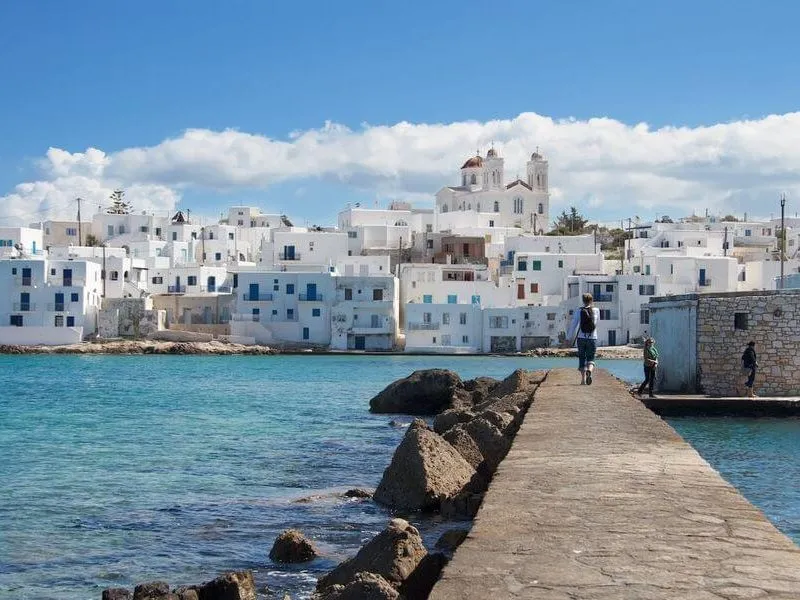



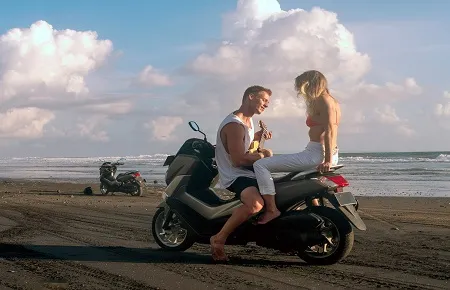


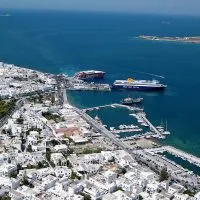
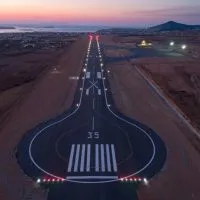
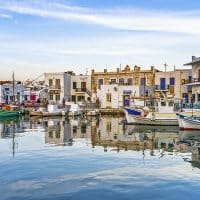

 By subscribing, you agree to receive promotional offers from Chaniotis Paros Rentals in accordance with the General Data Protection Regulation (GDPR). You can unsubscribe at any time.
By subscribing, you agree to receive promotional offers from Chaniotis Paros Rentals in accordance with the General Data Protection Regulation (GDPR). You can unsubscribe at any time.


